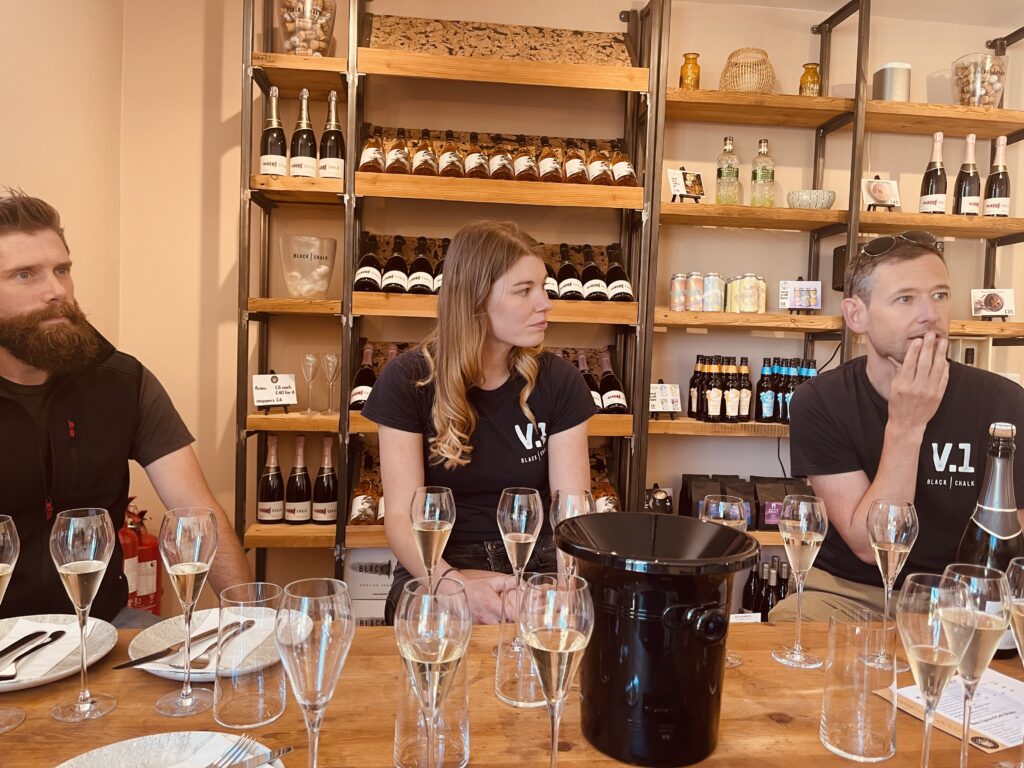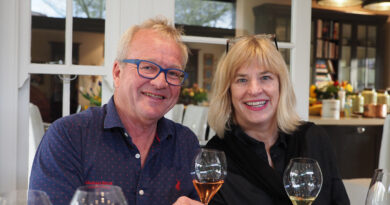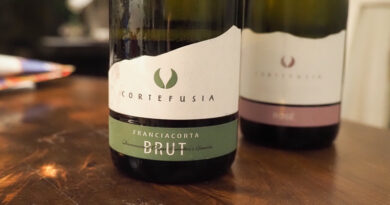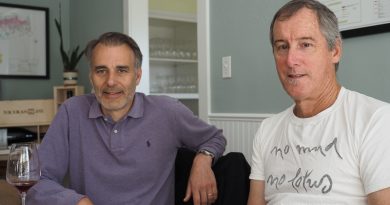Black Chalk: visiting one of the UK’s leading sparkling wineries
Chance delivered both opportunity and killer blows to Black Chalk in quick succession – it was to prove the making of this tight knit team
Jamie Goode and Lisse Garnett went to meet them..
Jacob Leadley has held a messianic faith in Hampshire chalk for over seven years. Utterly convinced of its potential to create insane sparkling wine he risked everything to buy his own vineyards and build a winery – a mere week before lockdown hit.
It might have sunk a softer team, but Jacob, James and Zoë are made of sterner stuff. Today this decision is bearing fruit: all of the wine made at Black Chalk is made from owned vineyards. With 35 clone rootstock variations on 30 acres (spread across three vineyard sites) – coupled with small and varied batch pressings, the team have a palate to play with that is worthy of the artistic Black Chalk name.
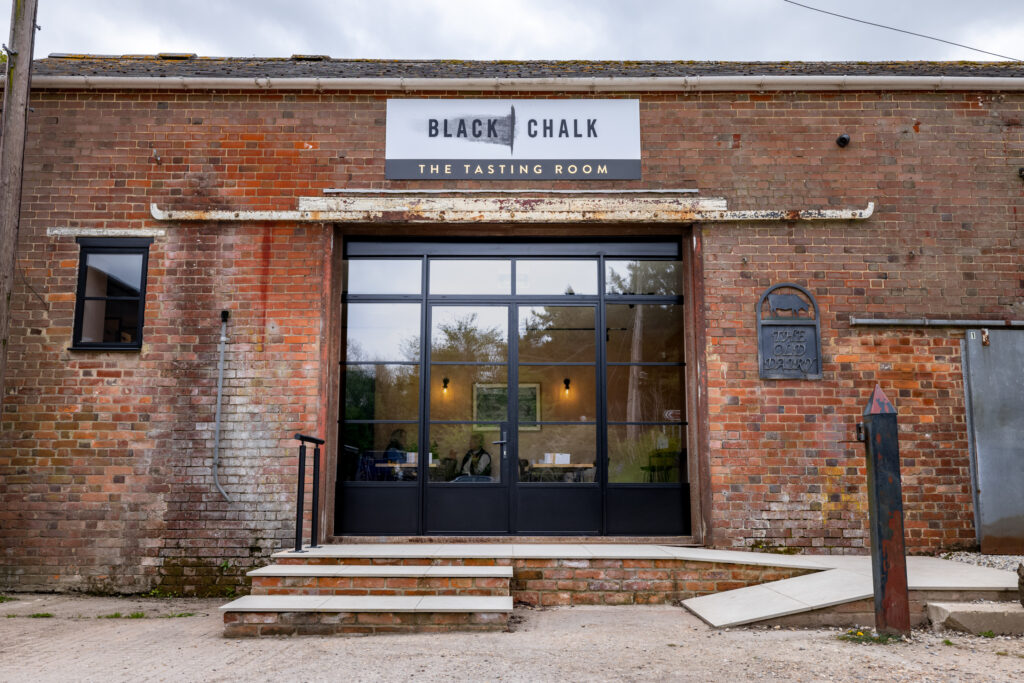
Outside investment, micro-vineyard management and subsequent knowledge accumulation allows this team to place Hampshire’s potential elegantly in bottle. Frost is a constant risk but these three are not readily cowed.
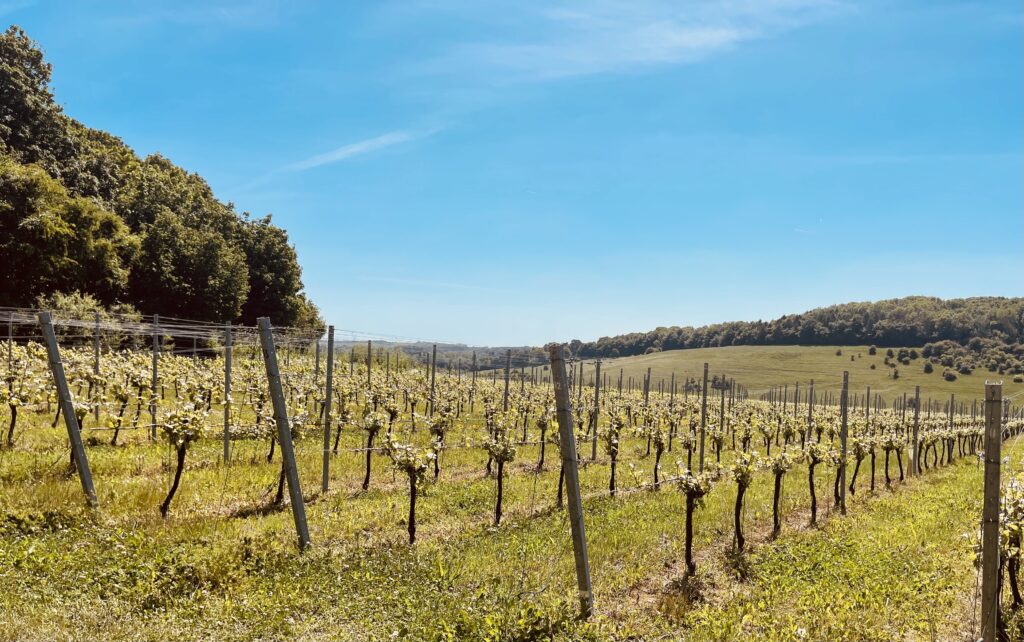
Black Chalk is named after the charcoal or black chalk artists use to sketch their outlines. 30 acres of prime Hampshire chalkland is farmed and small batch production is key to this operation. A recently constructed winery – converted from an existing cow shed, offers an impressive and pristine symbol of what’s undoubtedly to come. Inside a variable capacity Cocquard PAI press takes pride of place.
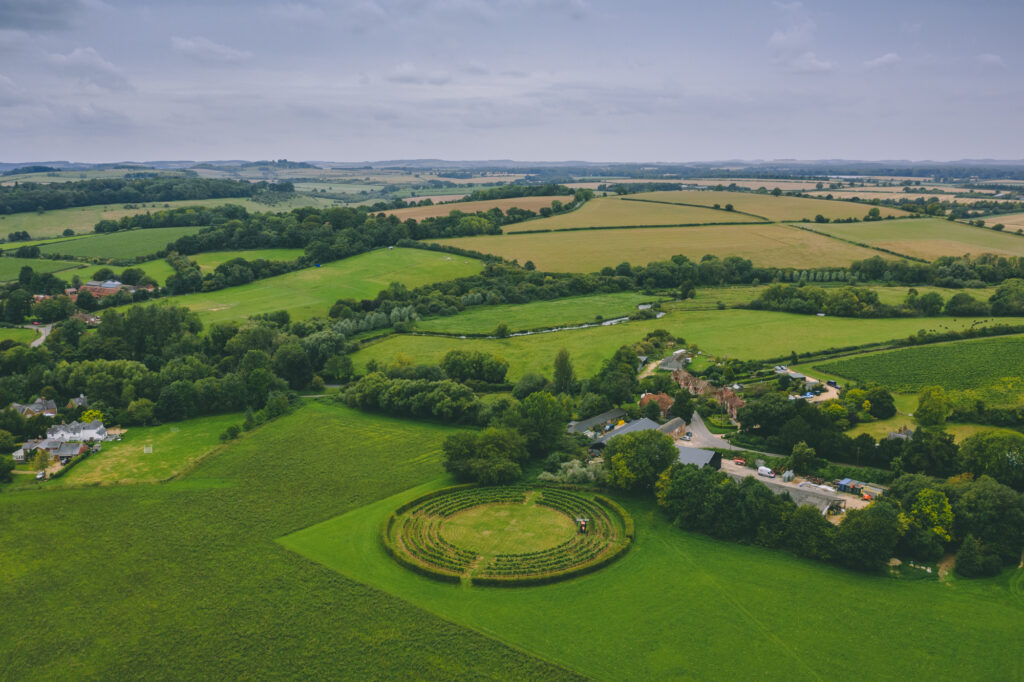
The newly opened tasting room and café is buzzing with guests. There is a druidic circular vine garden out back for latent hippies, picnics and kids.
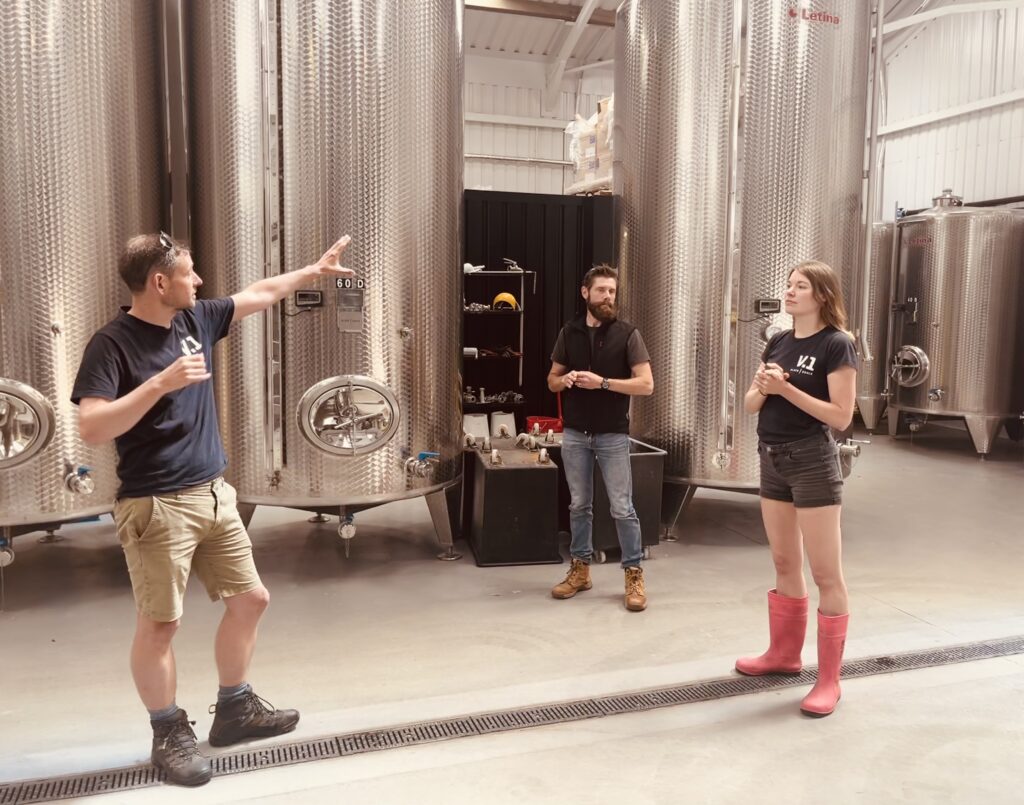
Jacob Leadley is Plumpton trained, as are his lieutenants – able Vineyard Manager James Matyear and Winemaking Assistant Zoë Driver. All of the team are converts – Zoë a brilliantly bright West London girl who discovered wine whilst working the vines to pay the rent during a gap year in Oz. Soulful bearded James is not born of farming stock either but exudes the kind of psychic plant knowledge that makes for cult like status. And Jacob, their leader – found wine by chance after a career in investment banking dried out his eyeballs and led him to seek solace in the wonderful wilds of Hampshire.
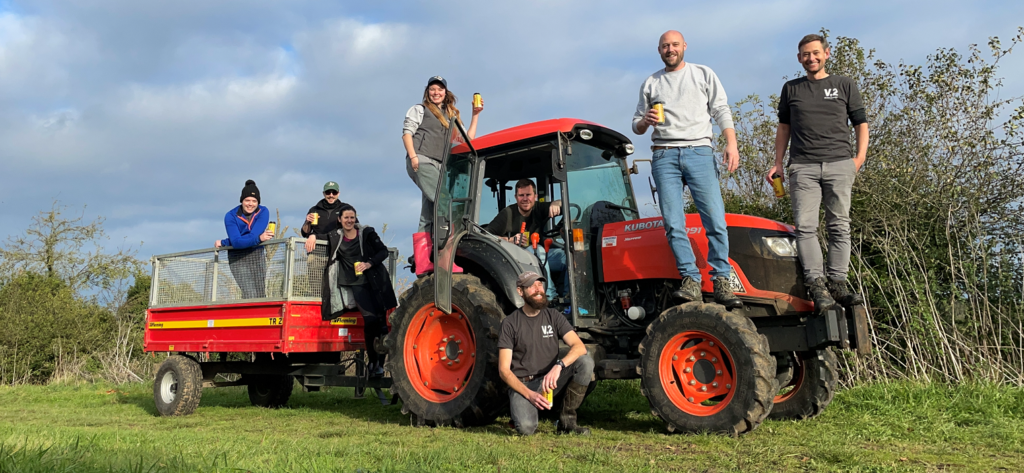
Jacob Leadley: When we started in 2015 I was working out of Hattingley Valley, the idea then was to buy grapes from pretty similar soil types to what we have here. I wanted to to try and make something that was small batch but that highlighted what I felt Hampshire could do really well – really bright fruit, really intense freshness.
Hugh Liddell planted this site, he had his Cottonworth wines. They started planting in 2008 and we made wine for them at Hattingley for seven or eight years so we knew what this fruit could do. We’d grown used to the high quality that was coming in from here, the only thing that wasn’t being done really was looking at it in the detail that we now are. Because it wasn’t being locally made and the grapes were contract managed, the detail wasn’t there.
When we started having a conversation about building a winery we agreed on a cow shed (which is where the winery is now) but then they said, ‘Well if you want to do that you are going to have to take on the vineyards as well.’
That changed the whole project, almost to the point that it nearly broke it. Taking all of this on required a lot more thought, we had to get investment.
I am not rich. There are a lot of projects like that and I think that they don’t necessarily know what they are doing nor why they are doing it. They want to make ‘a good wine’ or ‘a premium wine’. That’s not what Black Chalk is about. A big part of what Black Chalk is about is the people that are here and the passion that they have for their particular jobs and the hope is that this comes through in the wines. I know that might sound a little bit airy fairy but it’s very important to me – it’s everything to me. We have our little cringey hashtag which is, ‘it’s about the people’ – and I wouldn’t enjoy doing all of this if it wasn’t for the people we have around us.
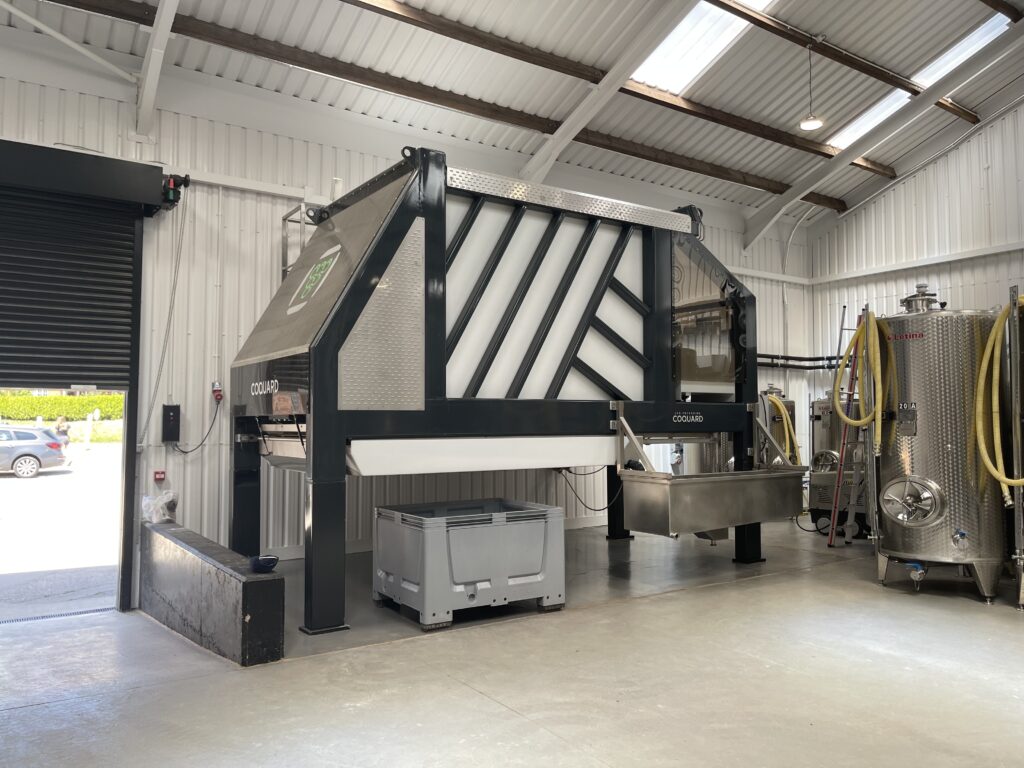
A massive part of these vines is that we knew what they were capable of. We’d spent the last two years getting to grips with them. James (James Matyear, Vineyard Manager) came on board last year, James used to manage these sites in 2015/16/17 and so that knowledge was already there. We’ve got a really good idea of what’s what.
Zoë Driver: Looking here, this is Meunier, two different clones and I could not describe how different those clones are, even though at harvest if you look to the labs – the results are so similar – we pick them separately, we vinify them separately and when we tasted the tanks it was like two different varieties. It was mad, it was amazing. And they are next door to one another. That level of knowledge is what gives us the palate to create our wines.
Jamie Goode: This is a level of parcellation – of detail that is fascinating – if you can dial down to that level…
Jacob Leadley: That’s what we are doing; it’s what we’ve been doing since 2020. I’m not sure that’s really what we were aiming for, although we were always about small batch, but the fact that are 35 different clone and rootstock variations planted across all three sites, it’s obvious to go to that level and the winery is designed to do that. We’ve got enough small tanks to be able to do it, and a variable capacity press which allows us to pick ten rows at a time. We can press them individually – it means a lot more work for us and a lot more complications but…
James Matyear: The soils are very classic for around here, so its shallow clay loam on a bed of pure chalk. We have a real badger problem here, you can see we have electric fences. There are deer, but we have some serious fencing. The problem is they gorge on the berries and leave the stalk to rot, and they’ll do a lot of damage – we have to keep going around and checking the perimeters, especially close to harvest.
This is probably the most beautiful spot. You can see where the Meunier ends. We’ve got some buds down here that are very tight, we’ve got areas where some have been nibbled so I tend not to shoot thin too soon because if we need to keep some of the crop, it’s not ideal as it creates a slightly more compact canopy. Everything is a little bit sporadic because we left the canes out very late, we had sacrificial buds so they would get hit first.
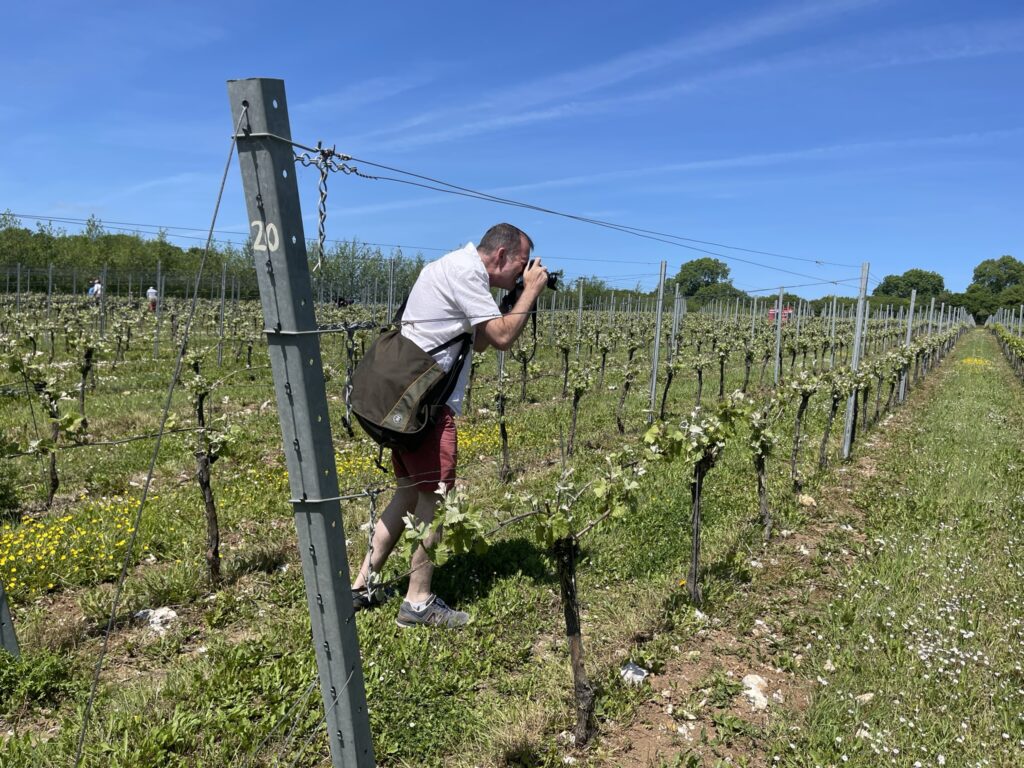
Jamie Goode: I like the idea that the sacrificial buds can buy you a couple of weeks insurance against frost because they are going to be the ones that go first. But all this growth is being pushed out by the carbohydrate reserves, because you haven’t got a net gain from photosynthesis yet. So what’s the impact of leaving sacrificial canes or sacrificial buds over several years? Does it depend on how much post-harvest photosynthesis you have?
Jacob Leadley: I think a lot of it depends on how far those sacrificial buds go before you get rid of them, you are going to lose them one way or another, you are either going to lose them to frost or cut them off and that’s the same if you use a sacrificial cane – how long do you then allow yourself to lose all of that energy? The last couple of years have been quite late frosts – mid May – not so much this year – but if you are leaving canes up for that amount of time it definitely doesn’t do you any favours. But the impact probably wouldn’t be huge because you vine is going to replenish a reasonable amount during growing cycle before it shuts down.
James Matyear: It’s a balance between the two, if we don’t do that we may end up losing all of our primary fruit it’s as simple as that and that’s happened in the past – this is all still being trialled and tested to see what best, we will get more and more areas where we have control zones and start to see if somethings worth continuing.
Jacob Leadlley: Frost is a major issue for us, much more so than over in Kent. We have the added complication of being slightly further inland and we also have the Isle of White which creates an additional buffer against any coastal impact – that probably has a bigger effect. We sit pretty much bang in the middle of the country, if you stretched a ruler from Bristol to the Kent Coast, and so if it’s a north-easterly or a north westerly cold wind we are going to get it. Whereas if it’s one of the others then maybe not so much.
At the same time there is heat accumulation, it does soak up the sun, that then has an impact on how well the fruit ripens. Coupled with the chalk soils (the purity that get from the chalk, not just in the Chardonnay but across the Pinot as well), this long growing season that improves the fruit character is so important.
Everyone talks a lot about Essex as the future of still wines and East Anglia and I couldn’t argue with that, the wines speak for themselves, but I still think that Hampshire is and will continue to be a major player for sparkling wine: the soil and the fact that its slightly cooler. We are never going to be struggling with too much alcohol like they achieved in Essex because it is just that little bit cooler especially at either end of the season.
The Levels is on a fantastic site and grows some amazing fruit. Rivers are our south facing slopes. The Levels are bathed in the sun, we love these sites so much. We picked the fruit in separate clones, pressed and looked at what we had and then created a wine without any preconceptions to really showcase the purity and the balance that we can achieve in this vineyard. It ended up being early Chardonnay dominant, something like 70% Chardonnay, not a lot of Meunier, it was a very different style, it had a very linear background, straight as an arrow – 2020 was a ripe year.
We don’t buy any grapes. You can have an idea when you are buying grapes but you can never have total control and I think that’s been the biggest positive about having the opportunity to take these vines on, having the opportunity to get down to that nitti gritty level and we have the freedom to be able to do that as the entire project is winemaker led.
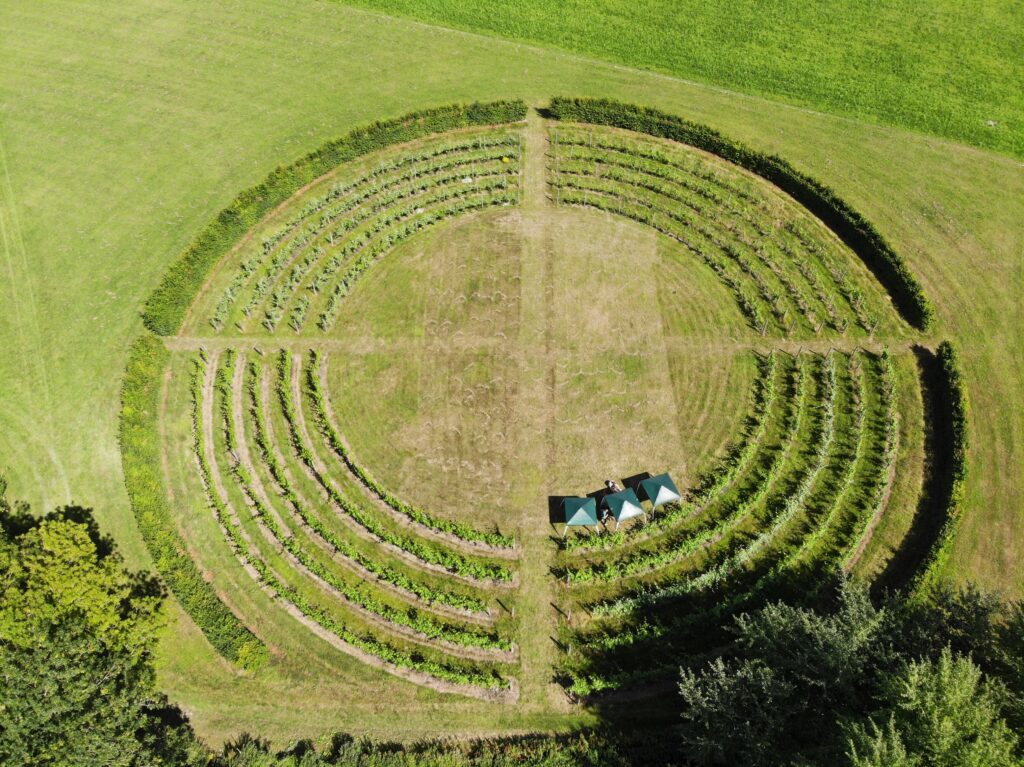
That’s why we started making wines in the first place. This is what we think Hampshire can do really well and that’s what we have continued to do and the investors that we have taken on are 100% behind that, they don’t interfere. Obviously you need to have a commercial hat on some of the time, that’s achievable as long as we continue to have the fun and the flexibility, we will continue to do weird and wonderful projects every single year.
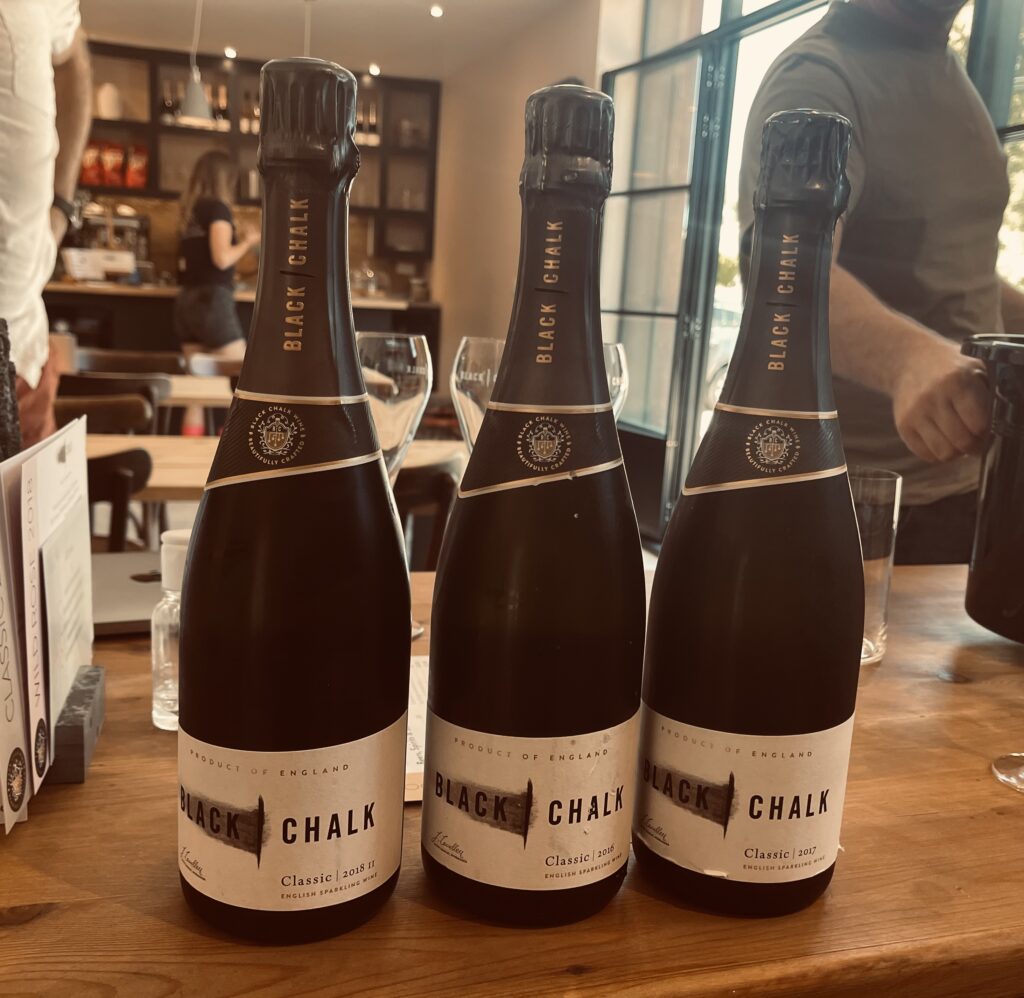
THE WINES
Notes by Jamie Goode and Lisse Garnett
Black Chalk Classic 2015 Hampshire, England
JG/Debut vintage released in 2018. 100% Hampshire all from within 10 miles of Winchester, made at Hattingley Valley. 45 Chardonnay, 30% Pinot Meunier, 25% Pinot Noir. Dosage 8 g/l. This has a lovely ripe nose with pear and apple and some honeyed richness, but the overall impression is one of freshness. This shows lovely brightness and weight on the palate with taut citrus fruit dominating, a bit of orange peel and a subtle honey note. Lively with some ripe apple and salty lemons on the finish. Dynamic in the mouth: it initially seems to have some development, but then the pure lemony fruit leads the fruit through. 93/100
LG/Debut vintage released in 2018. 100% Hampshire all from within 10 miles of Winchester, made at Hattingley Valley. 45 Chardonnay, 30% Pinot Meunier, 25% Pinot Noir. Dosage 8 g/l. Ripe red apple, salted lemon and subtle autolytic notes of brown bread – fresh and sapid on the palate, delicious and crisp with a lovely lemony salty note and just a touch of sweet brioche. 94
Black Chalk Classic 2016 Hampshire, England
JG/This is taut and lemony with some fruity delicacy. There’s a bit of melon and pear, too, with some fine citrus and even a touch of mandarin. The core here is a lovely crystalline citrus fruit core, with some of the Meunier red cherry poking through at the end. Very fresh but with generous fruit. Has a nice tapering finish with a touch of sweetness to the fruit. Lovely weight and balance here: this is so fine and is drinking beautifully now. 94/100
LG/Lemon sherbert pips, red apple and brown bread ice cream. A delicious sour candied lemon sherbet mousse with a a note of treacly brioche. 95
Black Chalk Classic 2017 Hampshire, England
JG/There’s nice concentration here, with some taut citrus fruit. Has a sense of harmony and a touch of honey and apple richness in the background. The palate has tapering citrus fruit, and a hint of red cherry in the mix, with good acid line. Lovely balance and weight. Some freshness but also some depth. 93/100
LG/Minerally and taut, lemon sherbet and candied lemon – a round and rich palate, super sapid but rounded and creamy with red apple sherbet and sour sugared lemon, Granny Smith and a touch of toast on the finish 94
In 2018 Jacob was leaving Hattingley Valley and he knew he wasn’t going to get anything running in terms of his own winery until 2020. But the opportunity came to take more fruit and make wine in another winery, so he took this. ‘I decided to do ths because the worst thing would be to have no wine available,’ he says. So in 2018 there was a classic released made in Hattingley, and also a wine labelled Classic II that was made at another Hampshire winery, in quite a different style.
Black Chalk Classic 2018 Hampshire, England
Very bright and fruit driven with lovely crisp citrus fruit. There’s nice precision and focus with a lot of fruit and keen acidity. There’s just so much fruit here, but also freshness. It’s vivid and expressive with a lovely sense of balance. Juicy and delicious with a twist of cherry. So pure. 92/100
Black Chalk Classic II 2018 Hampshire, England
JG/There’s a creamy undercurrent to the bright cherry, pear fruit with a citrus core. This is fruity and expressive with some nuts, cream and honey as well as good acidity. Some appley notes here and a nice acid line. 92/100
LG/Red apple, pear, vanilla and cotton candy. Delicious – lemony – light, fresh and biscuity with some higher sweet white blossom notes. 92
Black Chalk Wild Rose 2021 Hampshire, England
JG/Normally Pinot Noir, Pinot Meunier, Chardonnay (just to lift the fruit), but in this vintage, Pinot Noir, Pinot Gris and Pinot Precoce. 100% malolactic. Lovely bright fruit with a red cherry hint and some nice citrus core. There’s a slight sappy edge with a hint of grapefruit, with a juicy core and a nice dry finish. Lovely fruit here. 90/100
Black Chalk Wild Rose 2018 Hampshire, England
JG/Bright and expressive with lovely crystalline citrus fruits and a touch of redcurrant and spice. Lovely sappy hints with some juicy hints and a touch of spiciness. Supple and elegant with some roundness and lovely fruitiness. This is really nice and expressive. 92/100
LG/ Rose petals and red apple syllabub, salted lemon with a hint of lime. Fresh peach, brown sugar, crunchy cranberry, frozen raspberries and rose petals on the palate with a gorgeous spray of cucumber water and fresh apple syllabub on the finish. 92
